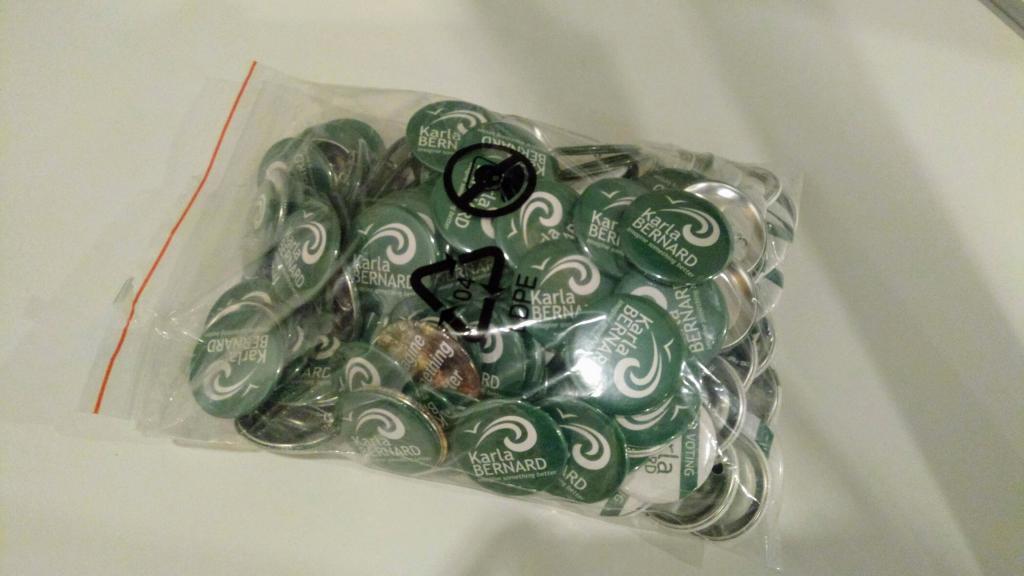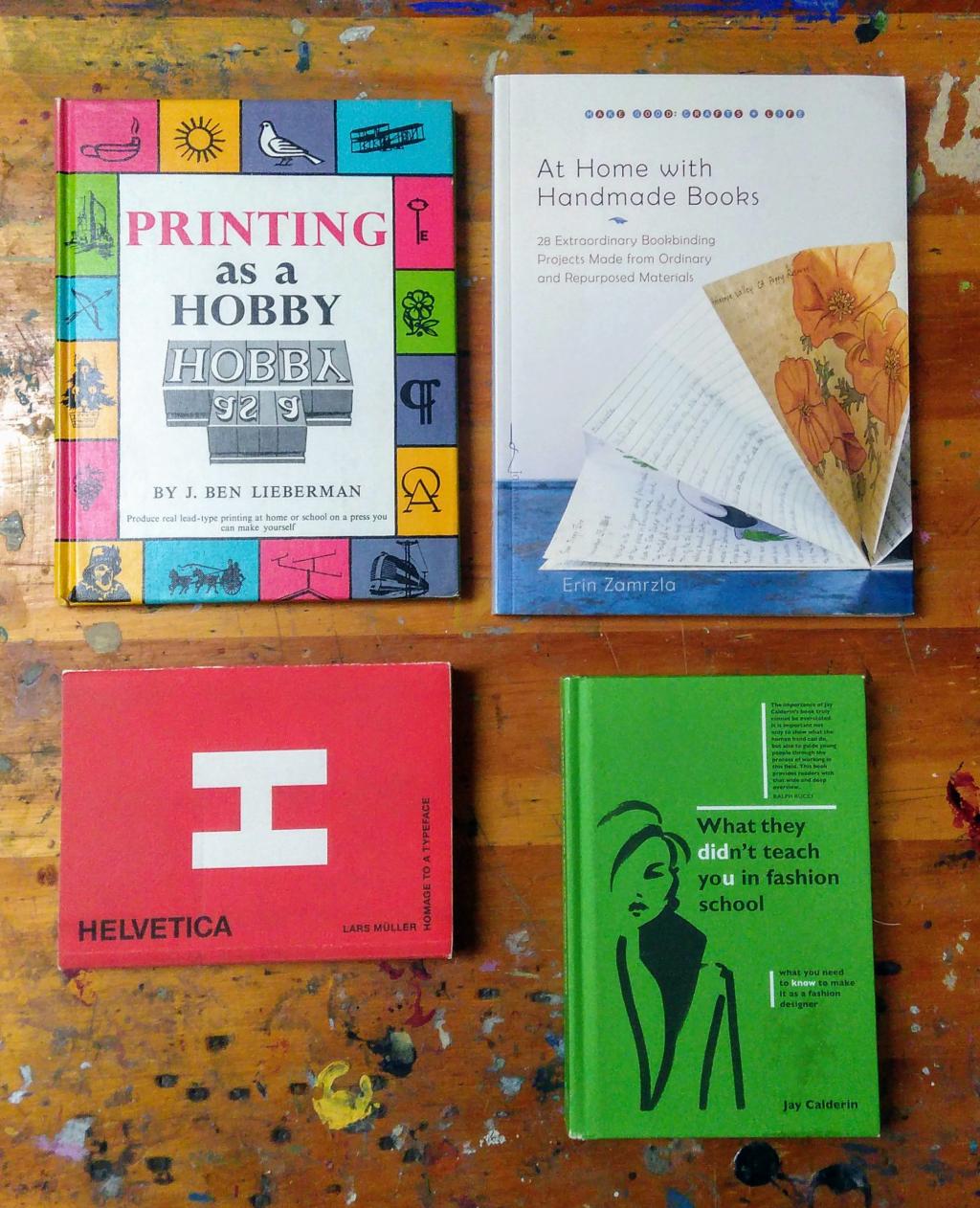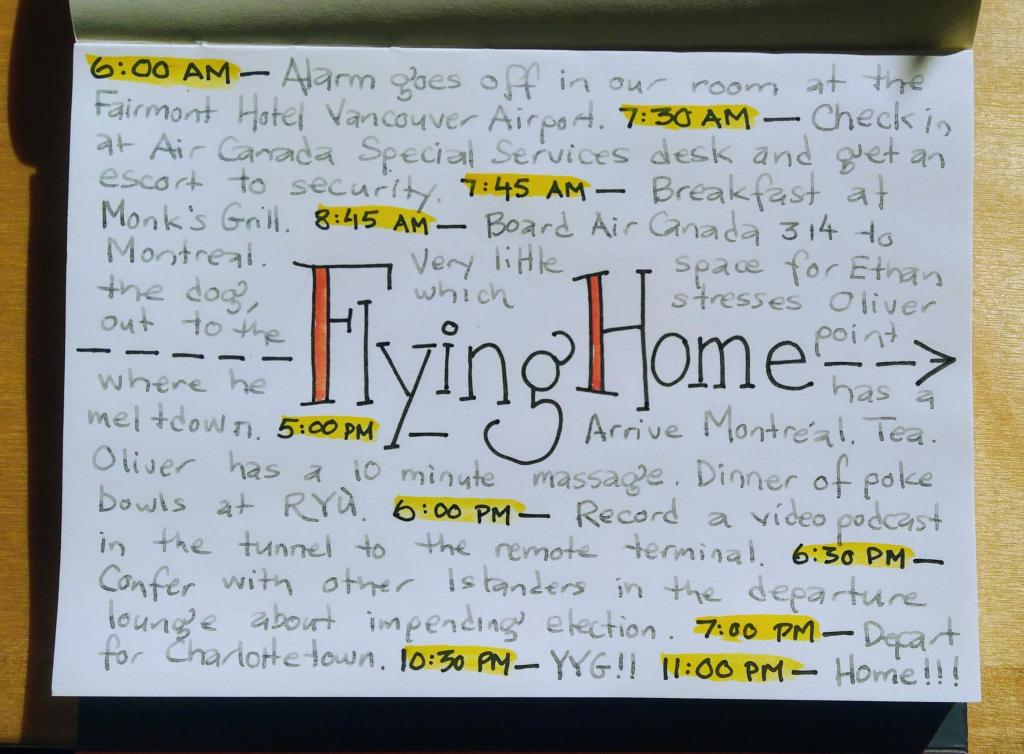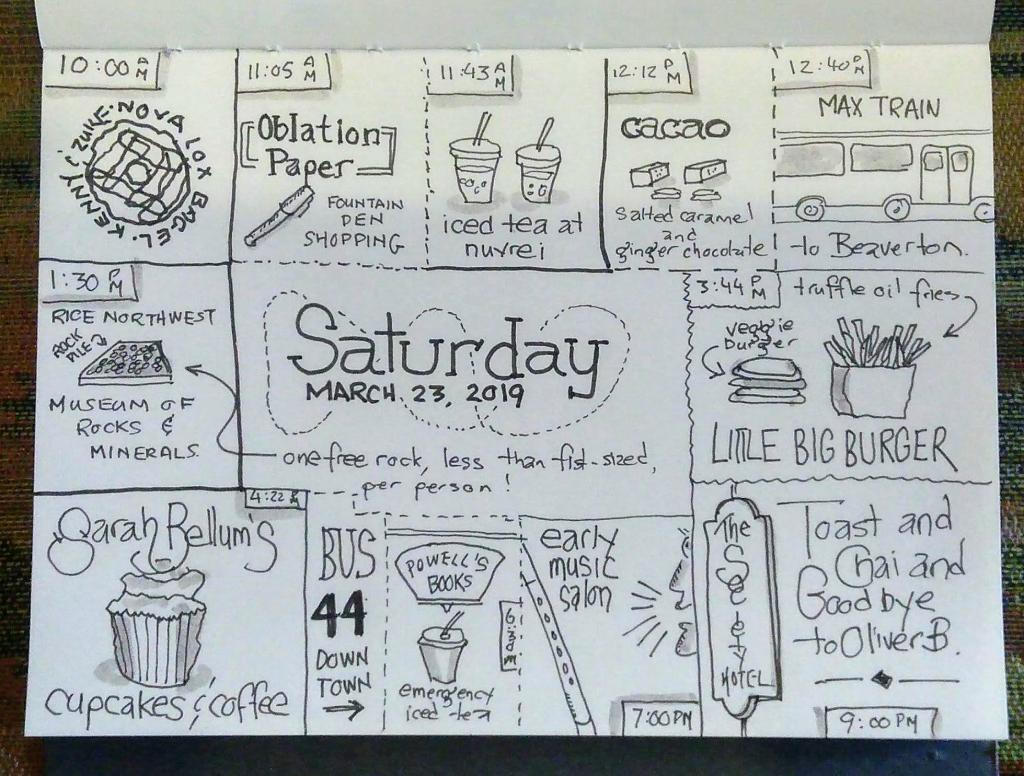In addition to reviewing analytics, planning future projects, and solving perplexing technical issues, today’s work schedule here in New Hampshire included a walk in Shieling Forest with my Yankee Publishing colleagues. Winter is holding on here a little longer than everyone would like, and the woods still had patches of snow and ice, but the temperature was 10ºC and there was a hint of sun.

After our walk, we regrouped at Pearl, where, among other delights, we enjoyed Prince Edward Island oysters:


Jason Kottke, in The Rise of the Fast Food Veggie Burger, writes:
A meat burger that costs a dollar is just being paid for in other ways by someone or something else.
That reminds of something I heard Sharon Labchuk say once, many years ago, to the effect that the beauty of Prince Edward Island can exist, in part, because of ugliness that we outsource elsewhere.
Just because we don’t see many large factories on the Island polluting the air and water doesn’t mean that there aren’t factories polluting the air and water, making the cars and washing machines and paper plates and running shoes and kayaks and macaroni that we use.
 I am not naturally a joiner of things, a quality that has mostly kept me out of party politics.
I am not naturally a joiner of things, a quality that has mostly kept me out of party politics.
As a teenager I did some volunteering for a local Liberal candidate, and in my 20s I managed the campaign office for an NDP campaign, but otherwise my experience of the electoral process has most intensely involved the non-partisan administration of elections technology: I was the person tallying the votes, with no stake whatsoever in who they were for; the idea that I’d be involved on the other side of the fence, so to speak, was anathema.
The idea that I’d join a political party, and say “in this I believe,” and, by implication, “in that, I don’t,” seemed like the kind of commitment that other people could take on; I was comfortable with my position as a disengaged independent, with a vague waft of progressiveness, who couldn’t be tied down.
And then some things happened.
Meeting Peter
First, Peter Bevan-Baker, the leader of the Green Party of PEI, got elected in 2015.
While politically a momentous exercise, and a great credit to the electors of District 17, the enduring image of election night 2015 was watching my friend Roy Johnstone, one of the pillars of Peter’s campaign, when victory was declared: with television cameras focused on him, Roy broke out into the kind of overwhelming ecstatic joy that I’d never seen the likes of.
That stuck with me.
After Peter assumed office as an MLA, and once he’d got a chance to get his sea legs, I invited him for coffee. We’d only met socially a few times, and I wanted to learn more about him, about the party and, to be honest, about why the smile on Roy’s face had been as indelible as it was. The person I met was kind, generous with his time, honest, thoughtful, a good listener, and not at all the kind of zealot I imagined that the leader of a political party must have to be.
Then, two years later, Hannah Bell was elected on the Green Party ticket here in Charlottetown, showing that Peter’s victory wasn’t a fluke, and that Islanders were starting to get behind the ideas espoused by the Green Party in greater numbers.
A Bill and a Motion
On an ideological level, I still had some distance to travel: I was raised by progressive parents, and I developed a deep belief in the NDP and its approach to politics. And a deep suspicion of capitalism. Last March I found myself in an NDP-heavy crowd in Ottawa, and their disdainful view of the Green Party didn’t help clear the air for me. I found myself at a loss to map my belief in the fundamental unfairness of our economic system with what I perceived as a Green Party that didn’t appear to concern itself with ideology as I typically understood it.
My resistance was eroded in part by two Green actions in the Legislative Assembly: the introduction of the Well-being Measurement Act in 2015 and the motion Encouraging government to adopt a “Health in all Policies” approach to governance in 2018.
The bill and the motion both reflected an ecological, systems-thinking approach to government that had enormous appeal to me (that they were greeted by government members with dismissive disregard troubled me deeply).
It wasn’t so much that these Green measures allayed my ideological concerns, but rather they suggested to me that, while perhaps not “post-ideological,” the Green Party did not exist at a fixed point on the traditional political spectrum.
Listening to Oliver
In parallel to all of this, I found myself influenced by my son Oliver’s embrace of the Green Party.
Oliver is one of the most intuitive people I know, and when he believes in something, I pay attention. Last summer Oliver started to go to Young Greens meetings, and this spring he joined both the provincial and federal Green parties. Watching Young Greens in action, and listening to Oliver interpret the Green approach, opened my eyes.
There is only “us”
Then, last fall, Bill McFadden ran for Mayor of Charlottetown.
Bill wasn’t running as a Green, but something he said had a profound impact on me; as I wrote at the time:
The second point that Bill made is that there’s no “us and them, there is only us.” He put this emphatically and eloquently, in a way that I cannot properly do justice without a transcript, but I appreciated both his message and his ability to communicate it.
I realized that, as regards politics and government, I’d been carrying around the notion, for many years, that there was a class of people in charge of things, and then there was the rest of us. Bill, both through his words and his actions, running for Mayor, jogged me out of this, and made me start to feel complacent, and as though placing myself, whether through determination or lethargy, as apart from the greater “us,” wasn’t a tenable position.
Toward Zero Carbon
At roughly the same time the IPCC report on climate change was released.
The report galvanized me. Not because of anything in particular to do with the science, or how much the planet is, or will warm, but by the concrete statements accompanying it that we need to move, in essence immediately, to a carbon neutral economy.
All previous messaging on this topic–the rabbit’s nest of “20% reduction from 2010 levels by 2030” and innumerable variations thereof–made no impact on me whatsoever, as they were abstractions built on top of abstractions.
Stop burning carbon now was something I could wrap my head around.
The question then became: how?
Over the winter we had an Efficiency PEI-sponsored energy audit of our house. While the results have proved a helpful guide toward making renovations to the house to make it more efficient, I was struck by the fact that the energy consumption of our house, if we spent multi-thousands of dollars and completed every single recommendation on the report, would go from 197 GJ/year to 126 GJ/year. That’s not nothing, but it’s also not carbon neutral. It’s nowhere near carbon neutral. And yet I’m told that I need to be zero carbon by 2050 at the absolute latest.
Something didn’t square. We need a real plan and I need real help. This wasn’t it. At least not boldly enough.
More Coffee with Peter
Late this winter, before the election was called and perhaps at the last possible time that he would have any free appointments on his calendar, I invited Peter Bevan-Baker to coffee again, and we chatted at Receiver Coffee for almost 90 minutes.
Two things emerged from our chat.
First, the Green Party is not an anti-capitalist party; it believes in the market. But, as Peter told me, there are many ways of practicing capitalism; Nordic capitalism and American capitalism, for example, are two very different things.
Second, Peter made it clear that, among the issues the Green Party prioritizes, process–the way we govern ourselves, how policies are developed, how consensus is arrived at, how collaboration happens–has as equal a seat at the table for Greens as anything else. In other words, perhaps one of the things standing in our way is not so much our ideas and our vision, but the way that we develop those ideas and that vision, and the way we bring them to fruition.
While my anti-capitalist gut is still grappling with the notion of capitalism and whether it’s a socially just way of running the world, I realized that, by maintaining my lackadaisical attitude toward political participation, I wasn’t really doing anything about that in the first place. And I began to wonder whether setting aside my allergy to a particular ideology in favour of supporting a way of working that might, if not eradicate it, at least see it practiced in a sustainable fashion, might be palatable.
The question then became: what if I decided to abandon that lackadaisical attitude and get involved? What political party’s values would map to my own?
I began to think that maybe Green values were my values.
Meeting Karla Bernard
And then I met Karla Bernard.
Karla is the Green Party candidate for District 12, Charlottetown-Victoria Park in the April 23, 2019 Provincial General Election.
When it became clear, in mid-March, that an election was in the air, Oliver and I invited Karla to come and chat with us. We had a wide-ranging conversation about the Green Party, about Karla’s involvement as Shadow Education Critic, about social justice, about her work as an educator and her interest in mental health.
She professed surprise at the situation she’d found herself in, never having imagined that she’d take on a political life. She emerged as an intelligent, committed, humble, engaged person. She seemed, as a parent, as someone in my neighbourhood, more like a regular everyday person than a slick and practiced deliverer of campaign messages.
I was impressed.
I resolved to vote Green in the election based on the strength of her character, and on everything else I’d learned about the Green Party and its approach.
And I resolved to support Karla’s campaign in any way I could.
Green Drinks
Then, last Wednesday, I joined Oliver at a “Green Drinks” meeting in the pub at the University of PEI, my first such event as anything more than a chaperone for Oliver.
I was heartened by the people I encountered there: candidates, members, and the curious. Smart people. Passionate people. And people pleasantly free of the rancour that it’s so easy to fall into in opposition politics. If I was going to Central Casting and looking for a group to run things, I’d happily accept the diverse group of people in that room if they were offered for the role.
Visiting Provincial HQ
On Thursday morning, I followed through on a commitment I’d made to Karla to look into making up some campaign buttons for her, and I ended up at the Provincial Green HQ on Water Street where I ran into my old friend Cynthia King and the party’s Election Readiness Coordinator Jordan Bober.
“Is there anything I can do to help the provincial campaign?”, I asked them.
Remember how there’s “only us?” It turns out that’s true.
By the time I left, 30 minutes later, I’d made a video about how to use the button making machine.
And I’d agreed to help maintain the Green’s campaign website.
And because they were going to have to share the to-be-released-on-Monday party platform with me as part of this work, I thought it only right that I join the party. So I did.
Which is how I found myself hunkered down in a corner of Peter Bevan-Baker’s district headquarters in Crapaud yesterday afternoon fiddling with CSS and resizing images.
And how last night Oliver and I spent 3 hours making buttons for Karla at Provincial HQ.
My Post-Cynical Era
As a casual cynic, as an introvert, as a non-joiner-of-things, I never suspected I’d be involved and committed in an election campaign.
But I’ve decided that it’s time to start believing in something, and the Green approach to politics is where I’ve set down: when I read the list of Green values–active citizenship and self-determination, a just society, living within our financial and ecological means, grassroots democracy, a culture of peace, local self-reliance–I see my own values reflected. It feels good. It feels right.
And of course it feels deeply weird too.
I will, indeed, be doing whatever I can to ensure that the promise of a Green government comes true, and to ensure that Karla Bernard, our District 12 candidate, is part of that team.
This has been perhaps the longest and most rambling candidate endorsement ever.
But I humbly ask you to consider joining me.

Prince Edward Island has moved to a system of having driver’s licenses produced by an off-Island company (historically they were produced in-house at the Access PEI site, while you waited).
The change has resulted in a bizarre new effect that the clerk at Access PEI referred to as “everybody looks like they have a beard.”
Here’s my last driver’s license photo, on the license that expires next week:

Here’s my new driver’s license photo, on the license that arrived by mail last week:

Not only does the new photo indeed make me look like I have a beard, but it also makes me look pale and, dare I say, cadaverous.
Which, according to Access PEI, is perfect acceptable.
In an Orwellian move earlier this year, the government, under the aegis of its “Climate Action Plan,” made driver’s licenses free for Islanders. I have been unable to square how making it more affordable to drive relates to climate change action.
Vicki Pipe and Geoff Marshall, who visited every railway station in England, Scotland and Wales in 2017, are back this week with All the Stations–Ireland.
Episode One is online now; it covers their crossing from England to Ireland on the ferry.
Powell’s Books in Portland lived up to its reputation as an excellent independent bookstore. I only had a short time to browse its stacks, but I quickly found four interesting books to bring home with me.

Oliver and I finished up our March school break trip to the west coast last night, arriving home just before midnight on the flight from Montreal.
While I posted some updates from the road, here I’ll sum up some of the highlights, longitudinally rather than chronologically. Think of it as a sort of “best of” listing.
Coffee
Deadstock in Portland was my favourite. Close in spirit and topography to the old ROW 142, the coffee was excellent and the vibe true to its “snob-free” tag line.
I also liked 49th Parallel in Vancouver, Victrola in Seattle, and Blackbird Bakery on Bainbridge Island.
Art
Hands down favourite was Le Montréaler, un homage au New Yorker, mounted in the underground walkway at Trudeau Airport that connects the main terminal to the satellite one. It was lovely to see the ubiquitous HSBC airport ads removed (at least mostly) in favour of a whimsical series of covers for an imagined magazine. Who ever thought that the transit to the barren wasteland of the Trudeau remote terminal could be so pleasant.
Runner up was the collection of art on the walls of Oregon Health Sciences University, a collection described as being “intended to enhance the healing experience for our patients and their families.”
Hotels
I’ve become a fan of Tablet Hotels, a curated hotel booking engine that maps to my aesthetic. We booked our stays at The Burrard in Vancouver and Palihotel in Seattle through Tablet, and the descriptions there matched what was inside the tin.
My favourite hotel, however, was The Society Hotel in Portland, which I booked directly. Located in Old Town, the hotel had a simple, well-designed room with a king bed and a fold-down IKEA sofa and a set of simple plywood and metal accessories. The lobby sported a solid café, and the beautiful, sunny, warm weather meant that we got to enjoy their rooftop deck in a way that a trip a month earlier wouldn’t have allowed. The hotel was convenient to a waterfront park (for walking Ethan), and handy to public transit. I would certainly stay there again.
Honourable mention goes to the Fairmont Vancouver Airport, which will likely be the most per hour I ever spend on a hotel room. But it was worth it to stay at the airport and thus avoid the stress of an earlier wake-up and morning commute (we do everything we can to reduce airport stress). The room was suitably ostentatious, with louvered doors between the bedroom and the bathroom, futuristic controls for the lights, very, very comfortable beds and a stunning view of the runway and Vancouver Island beyond.
Transportation
Awards must go to the Air Canada Special Services Desk at Vancouver Airport, and especially to agent Monica, for getting us checked in and accompanying us to security, clearing a path for us through the chaos. Truly exceptional service (that I’ve been sure to let Air Canada know about). Behind the scenes, Martine at the Air Canada Medical Desk performed miracles in helping rebook us around the Boeing 737 MAX groundings, which was also much-appreciated.
We traveled Amtrak four times: Vancouver-Seattle, Seattle-Portland, Portland-Seattle and Seattle-Vancouver. I love travel by rail, and this was no exception. The highlight was the business class segment we took from Portland to Seattle (business class only because the fare difference was negligible); this afforded us access to the lounge in Portland and slightly more room on the train. Amtrak staff on all segments were universally helpful in getting us set up with seats that would best accommodate Ethan the Dog.
Special Amtrak Award must go to Marty in the Lost & Found office at King Street Station in Seattle who located Oliver’s lost wallet, and tracked him down via his Dog Guides ID card.
The vegan burger sold in the on-board snack bar also deserves a thumbs up; it’s unusual to find non-meat options on trains, and it was a pretty good burger to boot.
Public Transit
We took public transit in all three cities we visited.
The easiest to manage was Portland, mostly because the HOP card was easy to purchase, easy to use, and had a simple $5/day maximum fare. Portland also supported payment with Google Pay via NFC, but this didn’t appear to support multiple passengers, so we didn’t get a chance to try it out.
Seattle’s ORCA card was similarly easy to use, but had a $5 up-front cost, and a more complicated fare structure.
Our experience in Vancouver was limited to the Canada Line, which runs from Vancouver Airport into the city. This was the only system of the three that used fare gates (Portland and Seattle are both honour-based systems), which made it more challenging to navigate with son and dog. But it got us downtown in short order.
Portland and Seattle were both blanketed with Lime and Jump dockless electric bicycles. There was no evidence of any allowance toward accessible bicycles, however, and so we were unable to try these out (this is what happens when active transportation infrastructure is left to an under-regulated free market).
Ethan the Dog
We had no troubles at all taking Ethan the Service Dog everywhere we went; only one person asked if he was a service dog, and nobody ever asked for proof.
The only odd occurrence was a security guard at the OSMI museum in Portland who asked us his breed and then put this out over the radio (for reasons unknown).
Ethan himself was a trooper, putting up with our different schedule, our different time zone, and different times for eating and peeing, with aplomb.
Mental Health
Oliver did exceedingly well at navigating the stressful maze of airport security which, due careful planning, we encountered only in Charlottetown and Vancouver.
As has often happened with similar breakthroughs, leveling up brought some new challenges into focus: without the chaotic aftermath of a complete meltdown to obscure things, we didn’t pay enough attention to the aftershocks of that stressful process, and so Oliver got stressed out during the boarding process more than expected. But we’ve talked about ways of mitigating this in future, and I’m hopeful we can keep traveling without this standing in our way.
When we were passing through the airport in Amsterdam last summer, Oliver used a robotic massage chair to help him calm down after security, and passing through Trudeau airport yesterday he spotted a real live human massager in the international terminal, so, with time to spare, we stopped so that he could have a 10 minute massage, which he really enjoyed. So there’s one strategy right there.
Oliver’s working on a list of things that he finds helpful in airports that he can send out to airports to help make them more accessible to more travelers.
I’ve become better at managing my mental health as a carer, and realizing that it’s stressful to support someone who’s anxious, and that my stress can have the unintended consequence of making things worse, not better. That’s one reason why the Strongest Families program, which we all three went through in 2017, was so helpful: it reinforced that we’re all in this life together, and that we all need strategies for coping.

In the end, the only area of human activity where I truly excel is in the organization of impromptu adventures while traveling. And there is no more fertile ground for this skill than the awkward night shoehorned between a late arrival in a new city and a following day of planned activities.
Arriving in Seattle from Portland on the 3:30 p.m. train as we did today was a prime example of this: all other things being equal we could have simply checked into our hotel, found a place to have supper, and then retired early after a day that was sedentary but somehow also exhausting.
But that is not my style.
So here’s what we did instead.
We did, indeed, take a cab to our hotel, a return engagement at the same Palihotel where we stayed on Tuesday night.
After dropping our bags and feeding and watering Ethan the Dog, we walked up the street to the Seattle showroom for the Tuft & Needle mattress-in-a-box company. I am confounded by mattress purchasing, and haunted by the memory of too much time spent in the basement at Leon’s being overwhelmed by choice and unable to get a true sense for how any given mattress will perform under daily use.
The mattress-in-a-box industry has a not unpleasant “we’re shaking things up and taking down Big Mattress” quality to it, but not being able to take their wares for a ride makes it similarly impossible to get a sense of whether their mattresses are actually any good for my body.
Enter the aforementioned showroom, which consists simply of four neo-rooms formed out of semi-transparent gauze, each outfitted with a mattress on which one is free to lay about and, relative to Leon’s et al, simulate day-to-day life. Tuft & Needle doesn’t ship to Canada, so the experiment was moot for our particular purposes, but it was pleasant to see things done differently, and the comfort of their beds gave me some hope that the made-in-Canada equivalent mattresses might work for me.
Thus-sated, we called an Uber and headed for Northwest Film Forum, in Capitol Hill, where I’d secured us tickets for Astra Taylor’s film What is Democracy?, a film that ticked our interests in both documentaries and politics.
We arrived with about an hour to spare, and so looked around the neighbourhood to see what we could see.
Oliver’s eagle eyes spotted a hair salon directly across the street that was, oddly, still open on a Sunday at 6:00 p.m. We poked our head in the door and found that they did, indeed, have a slot available for Oliver. And so he got his hair cut.
Twenty minutes later and freshly-shorn, we went looking for a place to eat and found a Poké Bar just up the street where we enjoyed bowls of rice, fish and seasonings along with iced jasmine tea.
We finished up supper just in time to walk across the street to the cinema, and got two seats in the second row, with a nook for Ethan to curl into right in front of us.
Northwest Film Forum is an interesting institution, equal parts film exhibition space and film school; the promos that ran during the pre-show revealed a collection of screenings and courses that would have made me comfortable renting an apartment nearby and dropping by every day.
What is Democracy?, as the title suggests, is an extended rumination on democracy. It is neither a class in civics nor a polemic, but rather a holding up of the sphere of democracy to the light, through the eyes of everyone from Cornell West to Miami school students to Syrian refugees living on the docks in Greece. It was heady stuff, and made all the more heady by a fellow audience member who started to yell out dissenting views early on and, when shushed by others, became militantly anti-social and was expelled from the theatre while yelling a series of epithets about how we who remained were sheep-like white people being lured into a cult.
The irony of the interruption in the context of the subject matter was not lost, but there was a significant collective sigh of relief when calm returned, as things could have easily gone further sideways.
The film was followed by a brief Q&A with the director, who was engaging and thoughtful.
When it was all done we piled into another Uber and were back in our hotel by 9:45 p.m., ready for bed and anticipating a final day of vacation adventuring in Seattle tomorrow.


 I am
I am